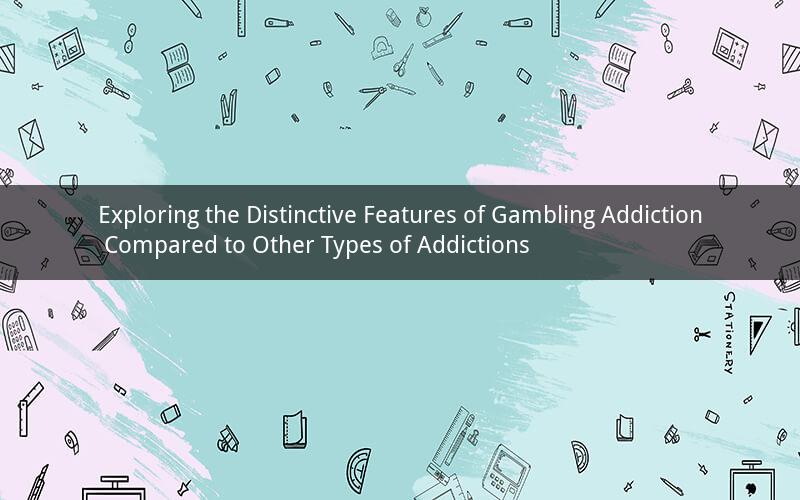
Gambling addiction, often referred to as gambling disorder, is a significant public health concern. It is characterized by the inability to control or stop gambling, despite negative consequences. While it shares certain similarities with other types of addictions, there are distinct features that set it apart. This article aims to explore how gambling differs from other addictions, such as drug addiction, alcohol addiction, and food addiction.
1. Nature of the Substance or Activity
Gambling addiction is distinct from substance-based addictions like drug or alcohol addiction. The substance in these addictions is tangible and has a direct physiological effect on the user. On the other hand, gambling is an activity that involves mental and emotional engagement. While it can be addictive, it does not involve the consumption of a substance.
2. Reward System
The reward system in the brain plays a crucial role in addiction. In substance-based addictions, the substance activates the brain's reward system, leading to the release of dopamine, a neurotransmitter associated with pleasure and reward. In gambling addiction, the reward system is activated through the anticipation of winning and the thrill of the game. The act of winning itself may not necessarily release as much dopamine as the anticipation of winning does.
3. Withdrawal Symptoms
Withdrawal symptoms are a common feature of addiction. While both gambling and substance-based addictions can lead to withdrawal symptoms, the nature of these symptoms differs. In gambling addiction, withdrawal symptoms may include irritability, restlessness, and difficulty concentrating. In substance-based addictions, withdrawal symptoms can be more severe and may include physical symptoms such as shaking, sweating, and nausea.
4. Social and Family Impact
Gambling addiction can have a significant impact on the individual's social and family life. It can lead to strained relationships, financial problems, and legal issues. While substance-based addictions can also have similar consequences, gambling addiction may be less visible to others. This can make it difficult for individuals with gambling addiction to seek help and support.
5. Treatment and Recovery
The treatment and recovery process for gambling addiction and other types of addictions can vary. While both may involve therapy and support groups, the focus of treatment may differ. For substance-based addictions, treatment often involves managing withdrawal symptoms and helping the individual develop a strategy to avoid relapse. In gambling addiction, treatment may focus on identifying triggers and developing coping strategies to manage cravings.
Q1: How does the psychological aspect of gambling addiction differ from other types of addictions?
A1: The psychological aspect of gambling addiction is similar to other types of addictions in that it involves the pursuit of a reward. However, gambling addiction is driven by the anticipation of winning and the thrill of the game, rather than the direct physiological effects of a substance.
Q2: Can gambling addiction lead to physical health issues?
A2: Yes, gambling addiction can lead to physical health issues. Stress, anxiety, and poor sleep patterns are common consequences of gambling addiction. Additionally, financial strain can lead to poor nutrition and lack of exercise, further impacting physical health.
Q3: Is there a genetic component to gambling addiction?
A3: Yes, research suggests that there is a genetic component to gambling addiction. Studies have shown that individuals with a family history of gambling addiction are more likely to develop the disorder themselves.
Q4: How can loved ones support someone struggling with gambling addiction?
A4: Loved ones can support someone with gambling addiction by offering empathy, encouragement, and understanding. They can also help by providing emotional support and connecting the individual with professional help, such as therapy or support groups.
Q5: Can gambling addiction be cured?
A5: While gambling addiction is a chronic condition, it is treatable. With the right combination of therapy, support, and lifestyle changes, individuals with gambling addiction can learn to manage their addiction and live a fulfilling life.
In conclusion, while gambling addiction shares certain similarities with other types of addictions, it also has distinct features that set it apart. Understanding these differences can help individuals with gambling addiction seek the appropriate treatment and support they need to overcome their addiction.